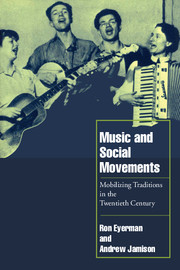Book contents
- Frontmatter
- Contents
- Acknowledgments
- Introduction
- 1 On social movements and culture
- 2 Taking traditions seriously
- 3 Making an alternative popular culture: from populism to the popular front
- 4 The movements of black music: from the New Negro to civil rights
- 5 Politics and music in the 1960s
- 6 From the sixties to the nineties: the case of Sweden
- 7 Structures of feeling and cognitive praxis
- Notes
- Bibliography
- Index
1 - On social movements and culture
Published online by Cambridge University Press: 26 October 2011
- Frontmatter
- Contents
- Acknowledgments
- Introduction
- 1 On social movements and culture
- 2 Taking traditions seriously
- 3 Making an alternative popular culture: from populism to the popular front
- 4 The movements of black music: from the New Negro to civil rights
- 5 Politics and music in the 1960s
- 6 From the sixties to the nineties: the case of Sweden
- 7 Structures of feeling and cognitive praxis
- Notes
- Bibliography
- Index
Summary
The new sensibility has become a political factor. This event, which may well indicate a turning point in the evolution of contemporary societies, demands that critical theory incorporate the new dimension into its concepts, project its implications for the possible construction of a free society.
Herbert Marcuse, An Essay on Liberation (1969: 23)Social movements and cultural transformation
Social movements are interpreted in this book as central moments in the reconstitution of culture. In the creative turmoil that is unleashed within social movements, modes of cultural action are redefined and given new meaning as sources of collective identity. For brief, intensive moments, the habitual behavior and underlying values of society are thrown open for debate and reflection, and, as the movements fade from the political center stage, their cultural effects seep into the social lifeblood in often unintended and circuitous ways.
It is our contention that both the culture of everyday life – the values, mores, and habits that form the basis of social behavior – and the “art worlds” of cultural expression are deeply affected by the innovative activities, the exemplary cultural actions, that take place in social movements. In the 1960s, Herbert Marcuse emphasized the aesthetic dimension of the movements of the time, suggesting that it was primarily in art and music that social movements “re-membered” traditions of resistance and critique (Marcuse 1969).
- Type
- Chapter
- Information
- Music and Social MovementsMobilizing Traditions in the Twentieth Century, pp. 6 - 25Publisher: Cambridge University PressPrint publication year: 1998
- 1
- Cited by

